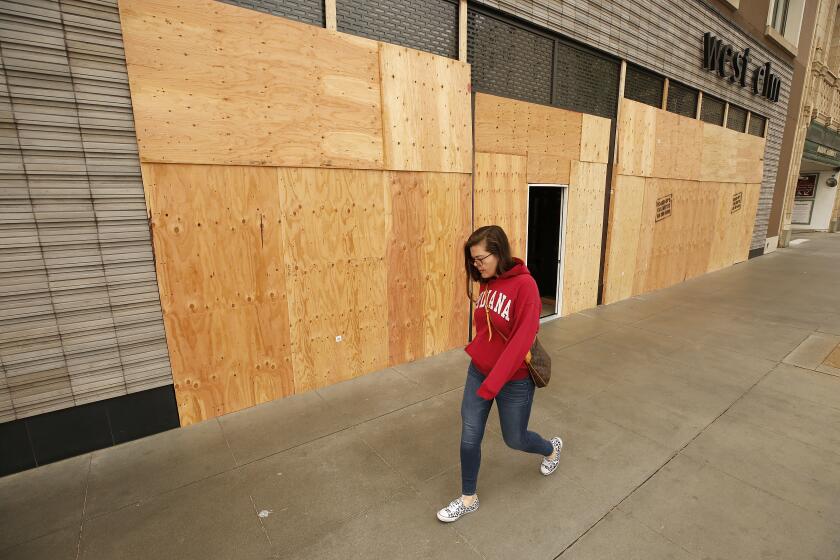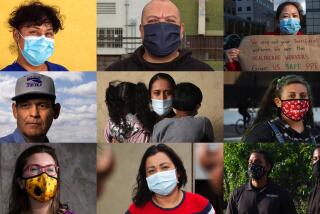California’s largest workers’ comp insurer just made it easier to file COVID-19 claims
- Share via
After catching COVID-19 and enduring weeks of an illness he thought might kill him, a 34-year-old medical technician at a Westside hospital said he needed more time to recover — physically and mentally.
He plans to file a workers’ compensation claim but worries about how his employer will respond. He has been able to take a few days off, but with stress issues, a nagging cough and unexplained bruises on his ankles that he attributes to the coronavirus, he thinks he needs more.
“I am very good at attendance,” said the technician, who requested anonymity fearing retaliation at work. “In this matter, I do want to take time to recover and heal and, you know, just get back to my daily routine. I need time off.”
Depending on which workers’ comp insurer his hospital does business with, he might be able to rest, recuperate and receive benefits that include replacing his lost wages. But approval of his claim is hardly a sure thing.
Late last week, California’s largest workers’ compensation insurer lifted a requirement that essential workers afflicted by COVID-19 prove they contracted the virus on the job. For many on the front lines in the fight against coronavirus, it means one less thing to worry about, particularly if they lack adequate sick leave or robust healthcare coverage.
The move by the State Compensation Insurance Fund, known as State Fund, will streamline the COVID-19 claims process for healthcare workers, grocery store checkers, public safety employees and others employed by the businesses and governmental entities it insures.
State Fund officials said the insurer had fielded about 20 COVID-19 claims thus far. About 1,500 claims have been filed statewide, according to the California Department of Industrial Relations, which oversees the workers’ comp system. Experts say those numbers could multiply and eventually cost insurers billions of dollars.
Such claims have historically been hard to prove and are often contested by insurers. Typically the burden falls on the worker making the claim to prove that the injury or illness is directly related to the job.
Even front-line healthcare workers might be denied, for example, in cases in which their spouses test positive for COVID-19 and could have been the source of transmission for the coronavirus, which is primarily spread from person to person.
Debbie Hammer, a senior claims consultant at Woodruff Sawyer, a large insurance brokerage and consulting firm based in San Francisco, said that without “presumed compensability,” illness claims can be problematic because of the inherent difficulty in pinpointing where and how a worker was exposed to an illness.
One notable exception involved a measles outbreak at Disneyland about five years ago. Workers at the Anaheim theme park who came down with measles were covered by workers’ compensation, she said.
“In the case of Disneyland, the employees were inherently exposed in a much greater way to the general public,” Hammer said. “Their jobs were right in front of the general public all day long, constantly, including to foreign visitors who were unvaccinated.”
State Fund’s revised eligibility will apply to workers who fit Gov. Gavin Newsom’s definition of “essential employees,” including those in food and agriculture, healthcare and energy sectors, and in emergency services. Although they are presumed to be eligible for workers’ compensation, they must show proof of testing positive for COVID-19 between the time Newsom issued his stay-at-home order in March and when that order is lifted.
State Fund, a quasi-public entity staffed mostly by state employees and supported by insurance policy premiums and investment income, has allocated $115 million to cover essential workers’ COVID-19 claims.
Though the coronavirus outlook has improved slightly, Gov. Gavin Newsom said there was no timetable for reopening California. “There is no light switch,” the governor said.
It will also continue to provide temporary disability benefits to any covered essential worker who must self-quarantine if they are not covered by another source.
“We are doing everything we can to provide our customers and injured workers with the support they need to make it through the COVID-19 crisis,” said Vern Steiner, State Fund’s president and CEO. “We have worked hard to be in a position where we can help, and we’re proud to stand with the essential workers who are risking their lives every day to hold our communities together.”
State Fund insures some 110,000 California businesses, or about 11% of the workers’ compensation insurance market.
It is not clear which, if any, other workers’ compensation insurers will follow State Fund’s lead and accept essential workers’ COVID-19 claims without question.
The Department of Industrial Relations said that 1,527 COVID-19 claims had been filed by April 16. But the agency did not address the L.A. Times’ questions about how many claims were approved, denied or pending. Nor did it respond to a request for information on other insurers that had eased eligibility requirements for essential workers.
Several states, including Kentucky and Illinois, have expanded workers’ compensation access to essential workers in public-facing jobs, including in grocery stores, pharmacies and daycare centers. Other states, including California, are considering similar measures.
The costs of covering all essential workers in the state could be in the billions of dollars, according to a recent research brief by the Workers’ Compensation Insurance Rating Bureau of California, which bills itself as “an objective provider of actuarially-based information and research.”
“The WCIRB estimates that the annual cost of COVID-19 claims on (essential) workers under a conclusive presumption ranges from $2.2 billion to $33.6 billion with an approximate mid-range estimate of $11.2 billion, or 61% of the annual estimated cost of the total workers’ compensation system prior to the impact of the pandemic,” according to the brief.
California has been approved to borrow billions of dollars from the federal government to pay unemployment benefits to those left jobless by the coronavirus pandemic.
The range in estimates is attributed to a variety of factors, including the unpredictability of how many Californians will contract the disease, and how many will have serious symptoms.
Hammer, the insurance claims consultant, said the number of workers’ comp claims was similarly unpredictable — and likely to grow.
“I do think a lot of claims out there will be coming down the pike,” Hammer said. “We haven’t seen them yet, but I think they’re coming, and we all need to buckle our seat belts. It’s going to be a bumpy ride.”
More to Read
Sign up for Essential California
The most important California stories and recommendations in your inbox every morning.
You may occasionally receive promotional content from the Los Angeles Times.


















